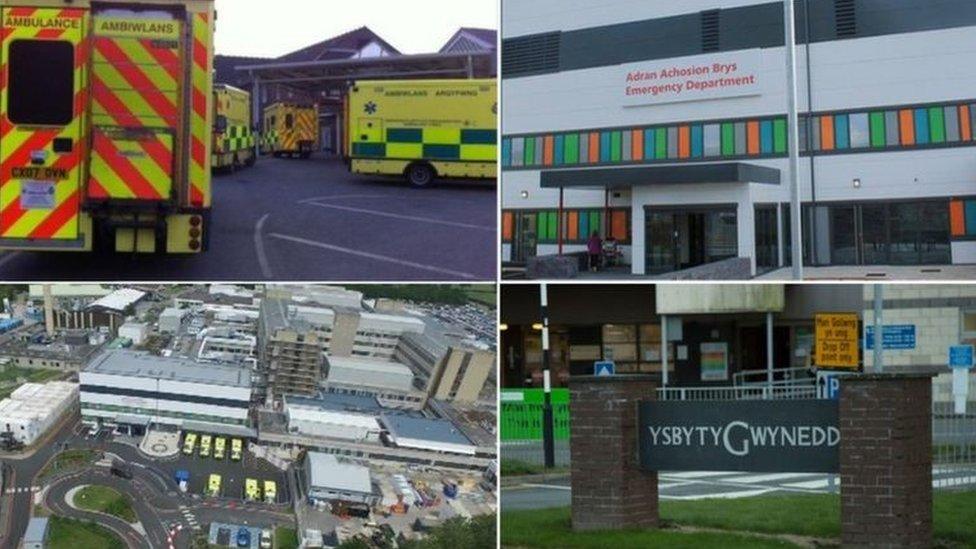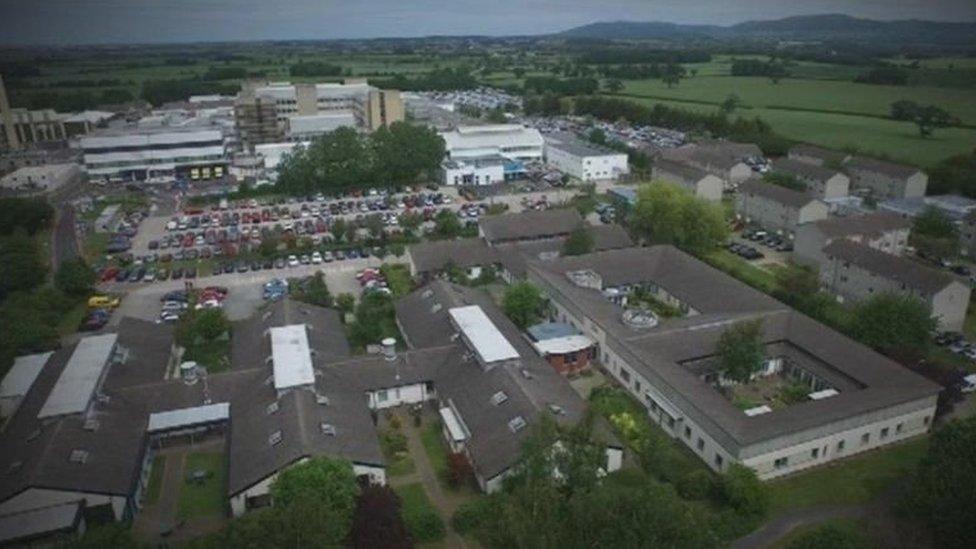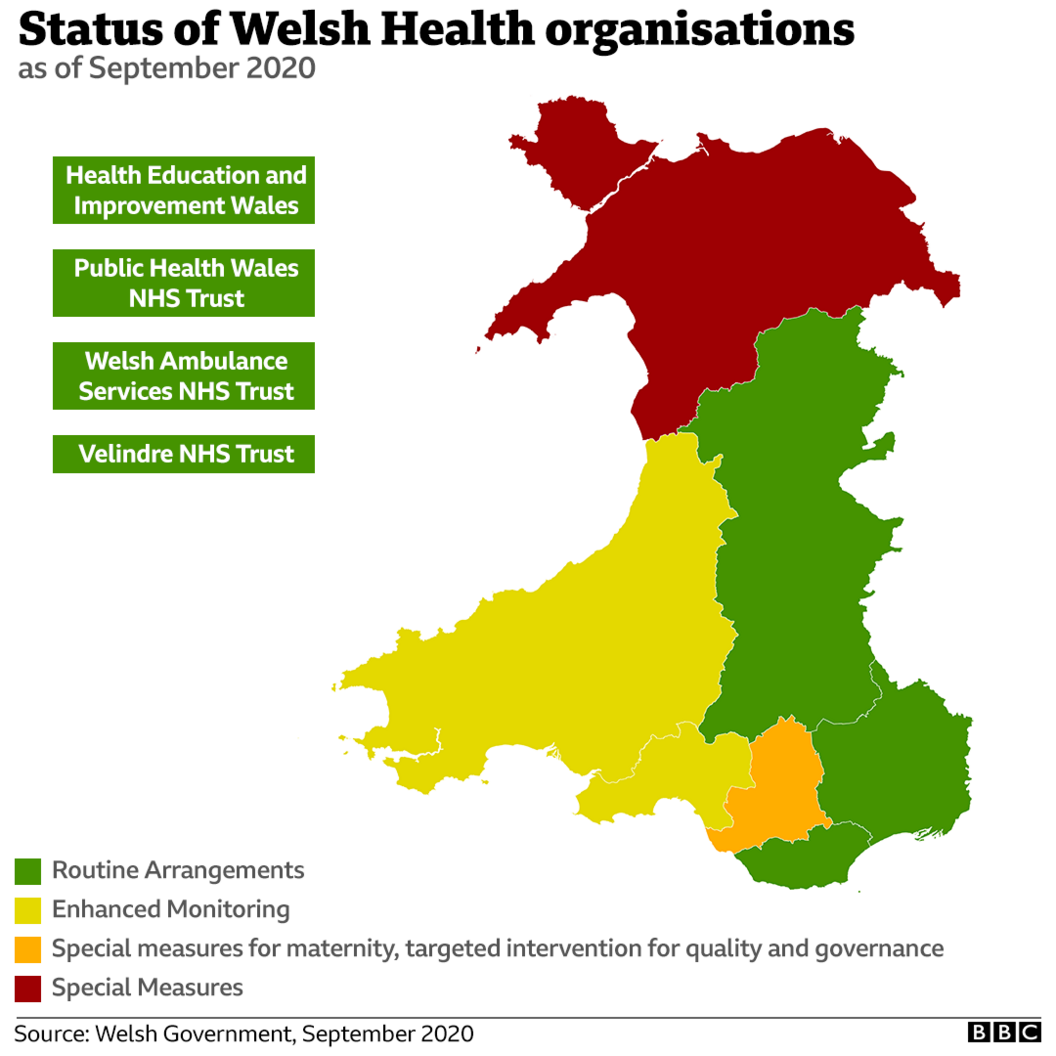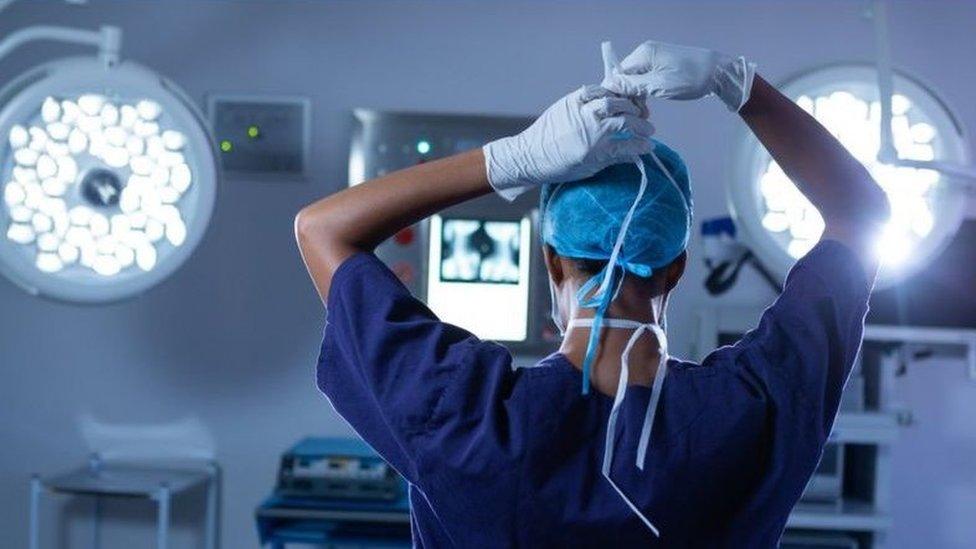Betsi Cadwaladr health board leaves special measures, 1,996 days on
- Published

Betsi Cadwaladr's responsibilities include three general hospitals
After a total of 1,996 days, Betsi Cadwaladr health board has been brought out of special measures.
The body responsible for hospitals and other NHS services across north Wales has been under Welsh Government direct control since the summer of 2015.
After a string of financial woes, management failings and growing waiting lists, the last straw was a damning report into a mental health unit.
But the health board is now judged to have made enough improvements.
Wales' Health Minister Vaughan Gething said he had received "clear advice" that the escalation status at Betsi Cadwaladr should change.
It will now move to "targeted intervention" which he said would still require "significant action" by the health board.
"We have seen improvements across the health board and have greater confidence that it will make further progress," he said.

A first of two damning reports into a mental health unit was the last straw and led to the whole health board being placed into special measures
As far back as 2013 - four years after the health board was created - Betsi Cadwaladr was said to be in crisis after deep-seated management and financial failings emerged.
Then issues started to snowball.
What were the problems?
2015 and 2018: Two damning reports into the now-closed Tawel Fan geriatric mental health unit at Glan Clwyd, with management said to be "chaotic". One report detailed family claims of abuse, although these were dismissed by the follow-up review.
2016: Plans to centralise specialist vascular care at Glan Clwyd hospital was criticised, with claims lives would be put at risk especially in the Gwynedd area. This row continues.
2017: Despite health bosses insisting improvements had been made, an independent review found financial planning, forecasting and risk management "simplistic, under developed and too isolated from service and workforce planning".
2018: Wrexham Maelor and Glan Clwyd hospitals posted the worst A&E waiting time figures on record in Wales.
2019: Progress on improvements was called "unacceptably slow" while its budget deficit rose to £42m. Auditors doubted the health board's ability to resolve its problems swiftly. There was criticism of a consultant hired to find savings, later dubbed "Marbella man" and costing £2,000 a day.
2020: The health minister finally signalled a way out - with the health board making "genuine progress," £40m extra funding to cover its deficit and a new chief executive. Jo Whitehead is due to start work in her native north Wales in January after running the health service in Queensland, Australia.

What do special measures mean?
Each health body is monitored for how its performing by health inspectors and auditors and given a rating.
Three health boards, as well as organisations like the Welsh Ambulance service and Public Health Wales, are under the lightest, routine monitoring.
Others in need of more help are subject to more intervention and this can be scaled up or down. The highest level is for maternity services at Cwm Taf Morgannwg and Betsi Cadwaladr, where the government takes a more hands-on role.

'Hugely symbolic' announcement
Individual patients receiving care right now won't notice much difference, particularly with the NHS up against it dealing with the latest wave of Covid-19.
But the announcement that Betsi Cadwaldr has finally been taken out of special measures is hugely symbolic considering its turbulent recent history.
It's been plagued with so many problems: leadership failings, serious failings in mental health services, some of the worst waiting times in the country and almost continuous financial problems.
Where it did try to make changes the health board consistently found itself up against fierce critics - a sure sign that parts of the population simply didn't trust those in charge.
But with the fourth chief executive in five and a half years due to begin in the new year, the health minister has decided now is the right time to ease the oversight, if only by a little.
Whatever the status of the health board, questions will remain as to whether Betsi Cadwaladr health board was doomed since its beginnings, in being too big an organisation to easily control?
What has the reaction been?
Mental health services should remain in special measure for "a little bit longer", according to the chief officer of patient watchdog the North Wales Community Health Council.
Geoff Ryall Harvey said the health board still had not implemented all of the recommendations from two inquiries into the Tawel Fan mental health unit at Ysbyty Glan Clwyd.
He said: "We believe that mental health services are different and that they should remain at that higher level for a while yet.
"The progress has been disappointingly slow, those were the ministers words not very long ago."
He told Gareth Lewis on BBC Radio Wales all requirements of a holding report that was issued in 2013 still have not been signed off.

The health board has been in special measures since 2015
Plaid Cymru's health spokesman Rhun ap Iorwerth said patients could be forgiven for being sceptical about what the announcement would actually mean in terms of improvements to services.
He said the health board's problems were chronic and structural and major changes were needed.
"We say it's time for a fresh start, with new health and care structures serving the north instead of the current board which is too large and remote from the communities it serves," he added.
Conservative health spokesman Andrew RT Davies said there was an important question about what had happened since last month to radically improve matters, after the health minister said there were still concerns, including progress in mental health services.
"I've heard of miraculous recoveries, but not like this, not when services have been so bad for so long," he said.
Mr Gething said: "Whilst there has been improvement, there are still areas of concern such as mental health and the health board fully recognises there is still further work to do.
"Targeted intervention is still a heightened level of escalation that requires significant action on the part of the health board."